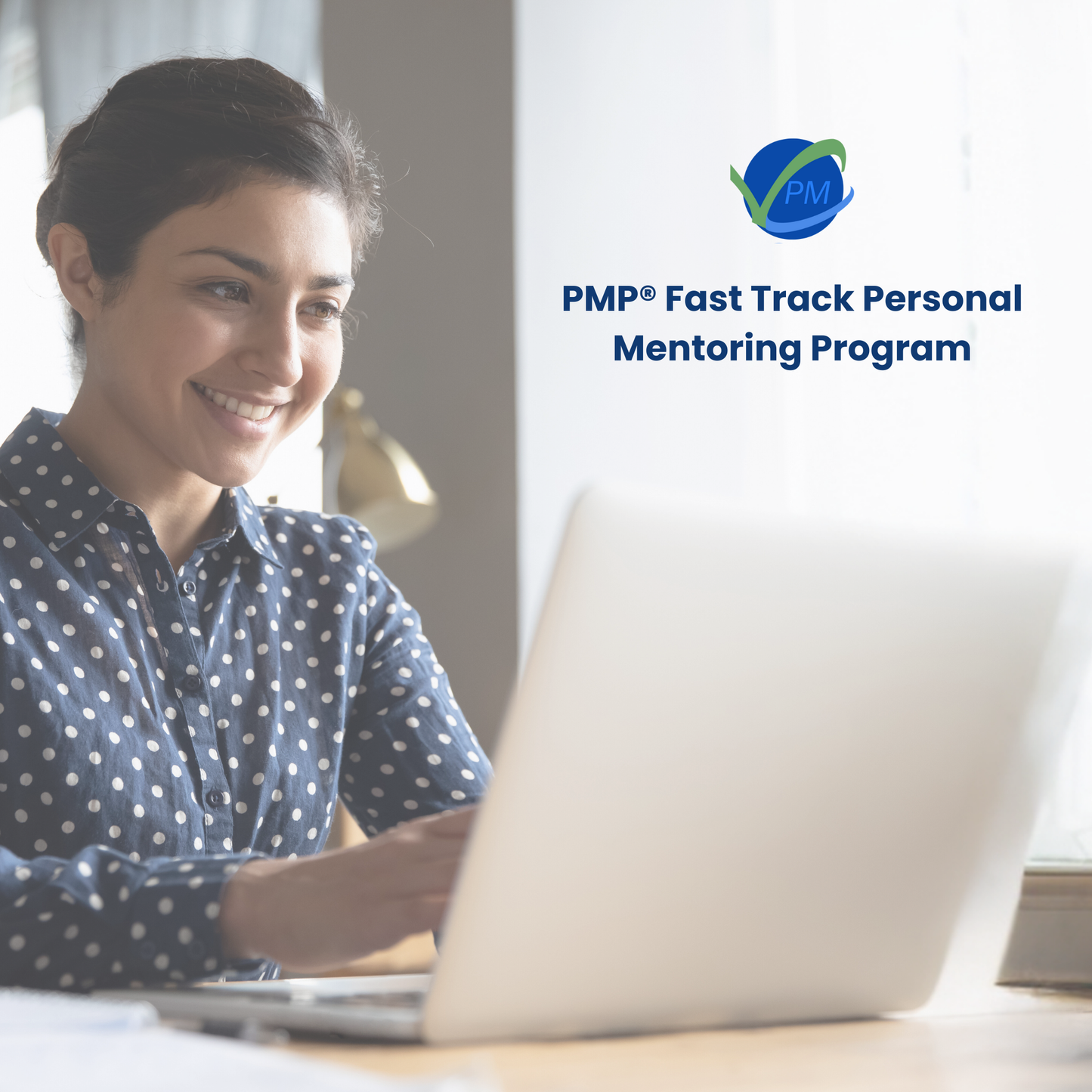Frequently Asked Questions
Find answers to the most common questions about our certification training programs, course formats, enrollment process, and special offers. If you need further assistance, our team is always ready to help!
Couldn't load pickup availability

This is a 4-week PMP® Online Personal Mentoring Program tailored to guide you through every aspect of PMP® certification. Delivered through one-on-one sessions, led by PMI-Authorized Trainers, this program offers a flexible and personalized learning experience. We provide official Project Management Institute (PMI) authorized PMP preparatory material shaped around the three PMP exam outline domains – People, Process, and Business Environment. You’ll dive deep into project management concepts, processes, and best practices, with each session customized to your learning pace and needs.
Program Highlights
• One-on-One Focus and Customized Study Plan: Every session (4 hr each) is designed around you, allowing for deeper exploration of topics and personalized attention to your learning needs
• Flexible Scheduling: Learn at your own pace, with sessions scheduled around your availability
• Focused Learning: Concentrate on the areas you need the most help with—whether it's mastering specific concepts or honing exam-taking strategies
• Comprehensive Exam Prep: Benefit from personalized study plans and expert advice on how to tackle the PMP® exam with confidence
• Ongoing Support: Stay connected with your mentor for continued guidance, feedback, and motivation
Key Learning Outcomes:
• Introduction & Project Management Foundation: Understand PMP® certification requirements and foundational project management principles
• Explore PMI’s project management framework, focusing on key domains: People, Process, and Business Environment
• Learn to plan and manage project scope while developing schedules aligned with organizational goals
• Master project cost management, quality control, and risk mitigation strategies for on-time, on-budget delivery
• Gain insights into best practices for stakeholder engagement and procurement management
• Learn effective project closing techniques to ensure successful completion and transition
• Review key exam readiness strategies, including mock exam questions and personalized success tips
Achieving PMP certification is a significant milestone in your project management career. This roadmap will guide you through each crucial step, ensuring you have a clear understanding of the process and what’s required at every stage:
Review PMI requirements + 35 contact hours of project management training.
Join a PMI Authorized Training Partner (ATP) for training
Prepare application and submit to PMI
Study resources and take mock exams
Redeem voucher or pay, then book exam
Take the exam, earn your PMP®
Earn required PDUs every cycle.
We help you quench your thirst for knowledge by providing you with our specially tailored certifications. Our highly qualified instructors, dedicated staff, and 24/7 available helpline are the main reasons why we’re the go-to training provider for you.
You won’t find better value in the marketplace. If you find a lower price, send us the offer, and we’ll
beat it.
Our instructors are PMI Authorized Trainers and bring current best practices and case studies to sessions that fit into your work schedule.
Official PMI®-licensed materials, ensuring every concept you learn is directly aligned with PMI’s global standards.
Find answers to the most common questions about our certification training programs, course formats, enrollment process, and special offers. If you need further assistance, our team is always ready to help!
We offer comprehensive training and mentoring programs for globally recognized PMI® certifications, including PMP®, PgMP®, PfMP®, PMI-ACP®, PMI-RMP®, PMI-SP®, PMI-PBA®and PMI-PMOCP™. All programs are delivered by PMI Authorized Trainers and include expert guidance and practical insights to help you succeed.
We offer both options of online and in-person. Our programs are available as live online sessions, where you can join from the comfort of your home or office, and as in-person bootcamps at select locations worldwide. This flexibility allows you to choose the format that best fits your schedule and learning preferences.
You’ll receive end-to-end support throughout your learning journey. This includes live access to expert PMI-Authorized Trainers during sessions, interactive Q&A opportunities, study materials and post-class support for clarifying doubts. Where applicable, you’ll also get access to our learning portal or mobile app with class recordings, learning resources, mock exams and practice questions. Our team provides guidance and support on exam application, preparation strategies, and regular progress check-ins to ensure you stay on track and confident until exam day.
Enrolling is simple and can be done in just a few steps:
Yes! We offer several ways to save on our mentoring and bootcamp programs. Discounts are available for members of select PMI® Chapters, professionals in our outreach categories (such as veterans, women professionals, and differently-abled professionals), and for group enrollments of three or more participants.
Please note that discounts apply to the full program fee, and only one discount or promotional offer can be used per order per calendar year. To check your eligibility and claim a discount, contact us at info@vcareprojectmanagement.com.
Have more questions? Send us a message, we’re happy to help.